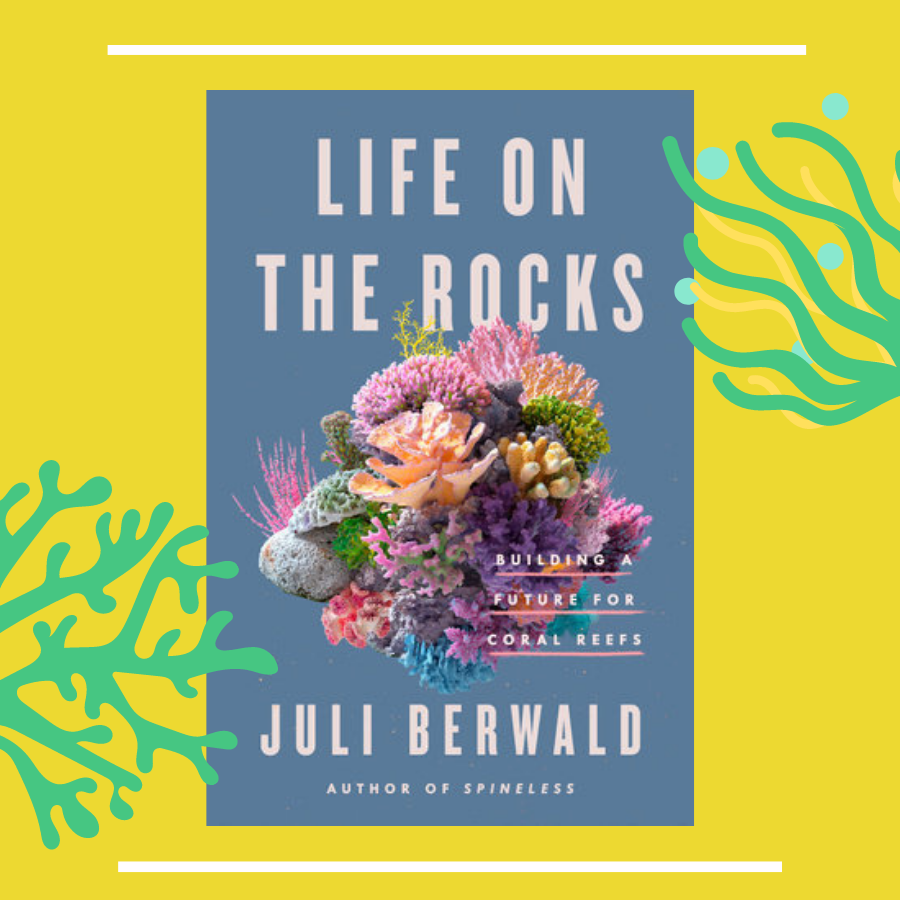Life on the Rocks: Building a Future for Coral Reefs is an informative and insightful look into the world of coral reef rescue. Writer Juli Berwald is an ocean scientist who is determined to understand every nuanced part of the issue. Throughout her detailed exploration of the current coral reef crisis, Berwald weaves in her journey as a parent to a child with OCD. At times personal memoir and at times reported nonfiction, Life on the Rocks ultimately proves that problems both global and local are interconnected, and working together is essential to solving them.
Juli Berwald is an accomplished science writer and ocean expert. She’s written science articles, textbooks, and even another book with a delightfully clever title that references both its scientific and memoir content: Spineless: The Science of Jellyfish and the Art of Growing a Backbone (2017). In Life on the Rocks, Berwald establishes the many reasons coral reefs are so important to the planet as a whole. From there, she takes the reader on a journey to discover what challenges the reefs are facing and what solutions are available.
The book begins with the Reef Futures 2018 symposium, where we get our first glimpse into the culture of coral lovers and ocean scientists. Part II, “What Keeps a Reef Together,” is a good primer on how corals work and why they’re important. While mostly informational, this section hints at Berwald’s meditative reflections on the connections between coral and ourselves. Throughout the book, Berwald continues to take what she learns about coral and community problem-solving and brings it inward.
The remaining six parts of the book are each devoted to a new location, allowing Berwald to explore the similarities and differences in local approaches to saving coral around the world. Throughout each part, Berwald also writes about her daughter’s increasingly debilitating struggle with OCD. Mental health, Berwald writes, is similar to coral in that it’s invisible, “but there’s nothing to be gained by keeping quiet.”
Berwald’s deep dive into the coral reef world takes her to symposiums like Reef Futures 2018 in Key Largo, restoration sites like the Mars project (yes, the same company that makes M&M’s and Skittles) on the island of Sulawesi, and seaside resorts like Iberostar Punta Cana in the Dominican Republic. She talks to Richard Vevers, star of the documentary Chasing Coral, about marketing strategies to increase public awareness (“People buy excitement,” he says). She learns about Force Blue’s program of dispatching literal warriors of the sea from its military veteran founders Jim Ritterhoff and Keith Sahm. She learns about fragmenting coral, freezing coral, underwater sound engineering, economic theories, and a host of other responses to the problems reefs are facing every day. In her book, Berwald synthesizes the seemingly infinite challenges that exist — and approaches to solving them — into a singular narrative of the movement to save coral reefs and pave the way for a healthier future.
At times, this non-scientist Minnesotan reader (The ocean? Where is that?) had trouble following the more in-depth biological descriptions and marine science explanations. The book is medium-paced — more science than memoir — and it’s written with the thorough attention to detail of a passionate researcher. But Berwald’s passion is contagious, and she writes beautifully about the coral itself, which she alluringly depicts as generous, hospitable, sensual, gorgeous, and powerful.
Most impressive is how Berwald seamlessly parallels the plight of coral with the struggles of mental health, feminism, and climate change at large. She proves how “[o]cean justice is inextricably bound to social justice.” Life on the Rocks asserts that everything is connected and everyone has a role to take. As Berwald considers human behavior and the barriers we often face in working together, she poses the question: “Isn’t guilt a piece of what makes us aware of injustice, and isn’t striving for a better world what makes us human?”

